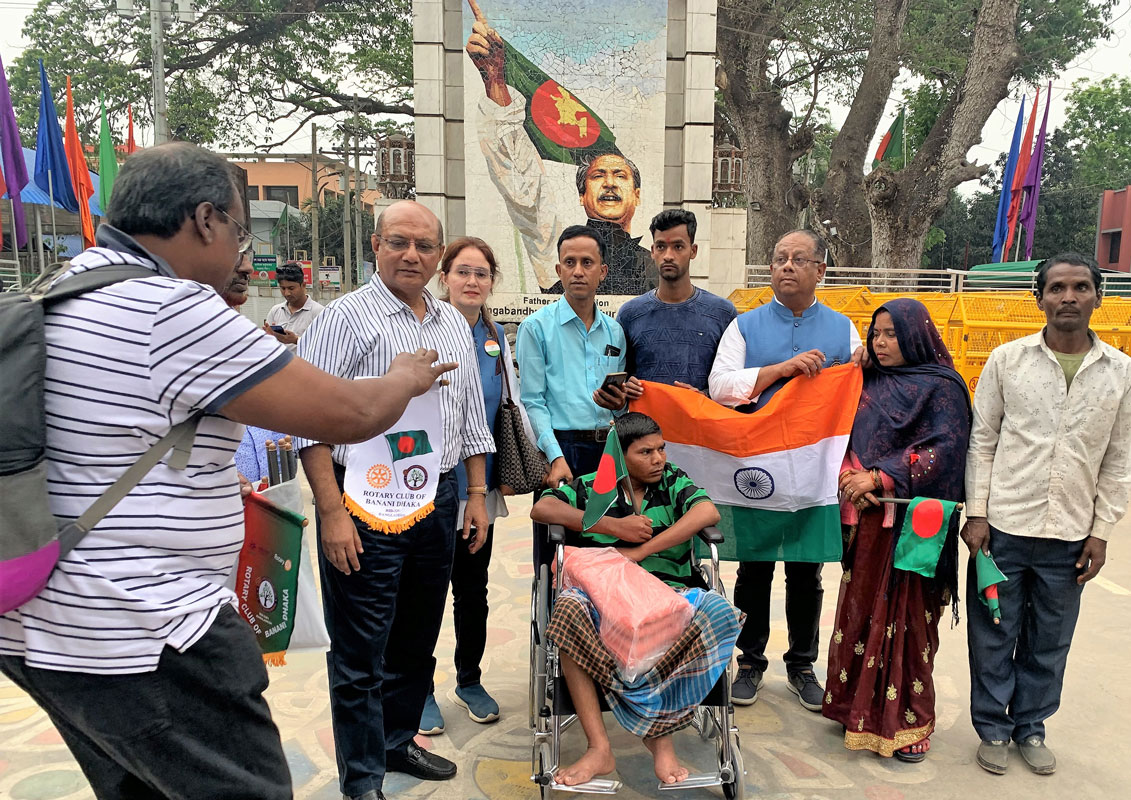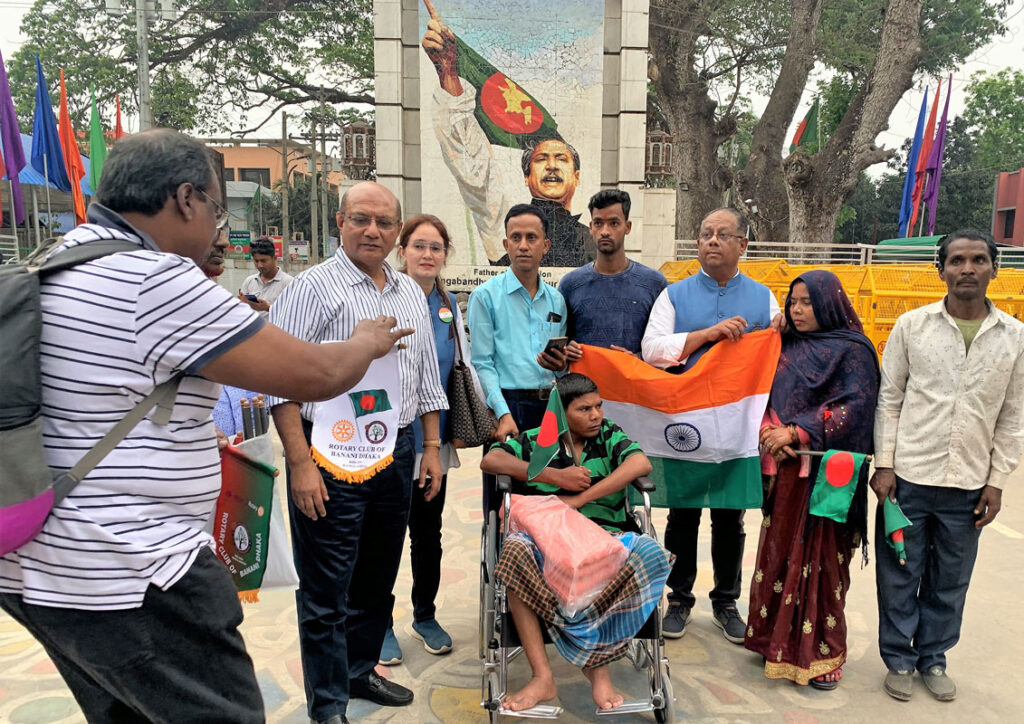A few years ago, Salman Khan’s Bajrangi Bhaijaan smashed records at the box office. The story was a heartrending one. A sweet and innocent little girl, who cannot speak, lands up accidentally in India from across the Kashmir border in Pakistan. The hero risks everything to reach her back to her parents. And in this task, he is aided by a journalist.

Well, that was in the realm of fiction; thanks to the close involvement and arduous follow up by some Rotarians in India and Bangladesh, we had a real life replica of the popular film, with Pakistan being replaced by Bangladesh.
It all began in June 2021, when an auto rickshaw driver in a locality in the Nilphamari district in North Bangladesh, about 400km from Dhaka, found a mentally and physically-challenged person in his mid-20s on the roadside. The man was sick, wounded and unable to speak or walk, and was obviously abandoned by somebody. The good Samaritan put him in his vehicle and took him to the Dimla police station. As he was sick and wounded, the police admitted him to the Neurosurgery department of the Rangpur Medical College on June 13, 2021.

He was kept here for general medical treatment for nearly three months. The youth required a hip joint replacement surgery, but as he had neither the money nor anybody to take care of him, no surgery was done. He gave his name as Subhash Prasad.
Thereafter, Subhash spent nearly a month surviving in one of the hospital corridors, after which the chief metropolitan magistrate of Rangpur gave permission to the Glory Shomaj Unnayon Shongstha, a shelter home for the handicapped, to take care of him.

Now comes into the picture a journalist, Shamsul Huda, a senior cameraman of Ekattor Television 71, and a member of Rotary Club of Banani Dhaka, RID 3281, and organising secretary of the Amateur Radio Society Bangladesh. While inquiring about the overall status of homeless handicapped person kept in this shelter house, he noticed Subhash, particularly because he could not speak Bangla, and was unable to give much information about himself and his origin. “He could give only his name and converse only in Hindi. He could not give me his home address, but only say he was from Ramnagakanda,” recalls Huda.

This was in August 2022. Taking a clue from this, the Rotarians used Google search engine and google maps and found this village was located in the Bahraich district of Uttar Pradesh, and was some 200km from Lucknow. He immediately contacted the Bahraich district police superintendent Keshab Kumar Chowdhury on Aug 2 and even sent him a picture of Subhash through Whatsapp on the cop’s mobile phone.

But not making much of a headway from this source, Huda, who refused to give up, next turned to his amateur radio network in Lucknow. This time he had dialled the right number. An amateur radio operator in Lucknow, Dinesh Chandra Sharma, was able to get for him the contact number of Subhash’s village panchayat leader Subedar, who immediately confirmed on seeing Subhash’s picture that he knew the youngster personally, as also the fact that he had been missing for quite some time.

At long last, the wheel started turning! Within a few minutes panchayat leader Subedar organised a Whatsapp video call between Huda and Subhash’s father Laxman Prasad, mother Sunita, two sisters Anjani and Shanjibhan. “I confirmed their residential address in Nidhipurwa, Bahraich district. What followed was a very emotional family reunion, on the video call, after almost a year and a half and his family members broke into tears. Sunita, his mother, asked detailed questions about whether Subhash was being taken care of properly as he could not look after himself. She also sent the medical prescriptions for his treatment which was being given to him when he was back home,” says Huda.
The parents are daily wage labourers and they live in a jungle area and hence had thought Subhash had been dragged away by a wild animal.
Huda and Rizwana have worked relentlessly for seven months to unite a young and mentally-challenged youngster with his parents. This is the unique international character of Rotary.
— PRID Kamal Sanghvi
Now the focus shifted to reuniting Subhash with his family; not an easy matter as it involved two countries — India and Bangladesh — and Subhash had no papers or identity proof of any kind. Even today those involved in his return back home are not sure how he landed up in Bangladesh in the first place. Perhaps, it is surmised, he was trafficked, but being both mentally and physically-challenged, he could not be used in any way, and hence was mercilessly discarded on the streets.
To bring the young man home, so much of paperwork was needed to be completed on both sides, beginning with establishing his identity. After several failed attempts to get Rotarians in eastern India take up this cause of reuniting the physically and mentally-challenged young man with his family, Huda finally struck chord with a Rotarian in Western India, Gujarat. Rizwana Zamindar, a member of RC Bharuch, RID 3060, who had joined WIRI (Women in Rotary International) network during the Covid pandemic. A past president of her club, Rizwana joined Rotary in 2015, and her husband Talkin is also an older member of the Bharuch club.
It took another woman Rotarian from the same Dhaka club, Shahida Naz Huda, to take the initiative on social media to create a dedicated team to organise Subhash’s return to India and reunion with his family. Finally, in November 2022, through the WIRI group, she got Rizwana interested in this cause, and she was fully supported by her husband Talkin. Rizwana was formerly an Inner Wheel member, and also president of an Inner Wheel club, “but since I wanted a deeper engagement in social service, I joined Rotary.
I have been actively engaged through my Rotary club in several social initiatives in Bharuch, and am a committee member in the My Livable Bharuch initiative launched by the district collector. In this, local citizens are actively involved in improving the living conditions in Bharuch, including sanitation, health delivery, cleanliness, and several community initiatives such as helping widows, and other underprivileged citizens.”
He could give his name and converse only in Hindi, and say he was from Ramnagakanda. As he could not speak Bangla I guessed he was a foreigner.
— Shamsul Huda
She is also an active member of her club, one of the older clubs in India formed in 1944, and before the Independence. It has over 150 members and she was the first woman to become its president. “During Covid, I was the club secretary and that time we had a lot of online meetings and made connections not only across India but also internationally. These online meetings made it so easy to meet people across the world and form contacts. So when Julia Gangwani started WIRI, I joined it and she made me membership coordinator. That’s how Shahida Naaz from RC Banani Dhaka reached me. She contacted Payal Biswas from a Bengaluru Rotary club; the latter knows me and asked me if I could help. They had contacted many Rotarians but were not getting any volunteers. I said I would do it.”
Interestingly, Rizwana’s own friends asked her “to be careful. They said this is between India and Bangladesh; your phone could be tapped, the circumstances of this case seem to be a little mysterious and so on. Even PRID Kamal Sanghvi, who has helped us so much, advised me that just confine the conversation on phone calls to this case and nothing else.”
This was in October 2022. Rizwana next touched base with Shamsul Huda and they started working together. Asked how Subhash ended up in Bangladesh, she says, “No one really knows. We had decided we would not get into the how and why of the case; the police were already investigating and that was their job. We concentrated on moving the paperwork. I would regularly call the Indian High Commission in Dhaka and simply say: “I’m calling from Gujarat, India, and would like to discuss about my Indian citizen Subhash Prasad’s return process! And Shamsul would work with his government. Our objective was to get Subhash back to his home and family in India.”
We decided not to get into the how and why of the case; the police were already investigating. We concentrated on moving the paperwork. I regularly called the Indian High Commission in Dhaka.
— Rizwana Zamindar
What strengthened Rizwana’s resolve to help was the fact that once “we had lost our passports in Malaysia and thanks to Rotary and Rotarians, we were able to get the necessary documents to get back to India within 24 hours. Both my husband and I felt now it was our turn to help somebody else.”
She was regularly in touch with the police officer crucial to this project — DSP Sparsha Nilangi in West Bengal who works closely with those at the Bangladesh border. She really helped in smoothening the immigration process. The Bahraich DSP Rajiv Sisodia also helped with the paperwork from his side.

Finally the documents were in place; Huda worked on the foreign ministry and the police authorities in Bangladesh to get Subhash’s return to India okayed; Rizwana worked to get his emergency travel document/passport from the Indian High Commission, and finally, Rizwana and Talkin reached Kolkata “where we were so kindly put up in PRID Kamal Sanghvi’s beautiful home in the city.”
On March 20, a car was arranged for Subhash’s parents and one more villager from Nidhipurwa village to the Bahraich railway station for the journey to Kolkata. But since their train tickets weren’t getting confirmed, flight tickets (from Lucknow to Kolkata) were booked for them on the spot. And they were also put up in Lucknow overnight at a hotel. All this meant extra expenses, but the Zamindar couple stepped in to help. “Yes, we had to spend money from our pockets but my husband said acchha kaam hei, let’s do it!”
By now Sanghvi was also on board and when the day dawned to take Subhash’s parents to Petrapole, the Indo-Bangladesh border, about 90km from Kolkata, he also joined the Zamindars to make the three-hour car journey; on the other side accompanying Subhash was Shamsul Huda.
Subhash recognised his parents and the reunion of the son with his parents was emotional. An emotional Sanghvi said, “This proves how much value a Rotarian has for an individual human life… Huda and Rizwana have worked relentlessly for seven months to unite a young and mentally-challenged youngster with his parents. This is the unique international character of Rotary, and proves that countries may be different and divided by borders but the hearts that beat within people are kind and compassionate. This is an outstanding example of the international character of Rotary and its human side.”
Rizwana also acknowledged the help of DG Anil Agarwal, RID 3120, for his “helpful primary coordination” for the verification of Subhash and his family members in Bahraich, UP. “PRID Sanghvi has given us positive encouragement through the entire process, which was pursued under his constant guidance and support.”
At zero point in Petrapole, a huge contingent of the Bangladesh media was present to report this heartwarming story. That evening, in Kolkata, RIDE Anirudha Roychowdhury hosted a dinner to celebrate this “international peace programme”. But the real celebrations were held in the jungle area of Nidhipurwa, with the entire village celebrating Subhash’s return… the reunion of a disabled son with his parents after three long years was a bright moment indeed in their tough lives.









